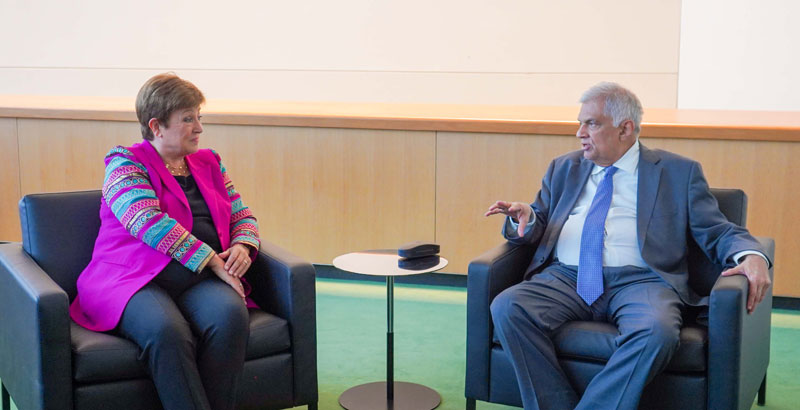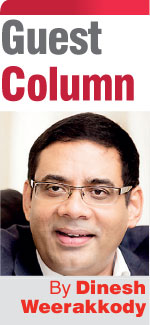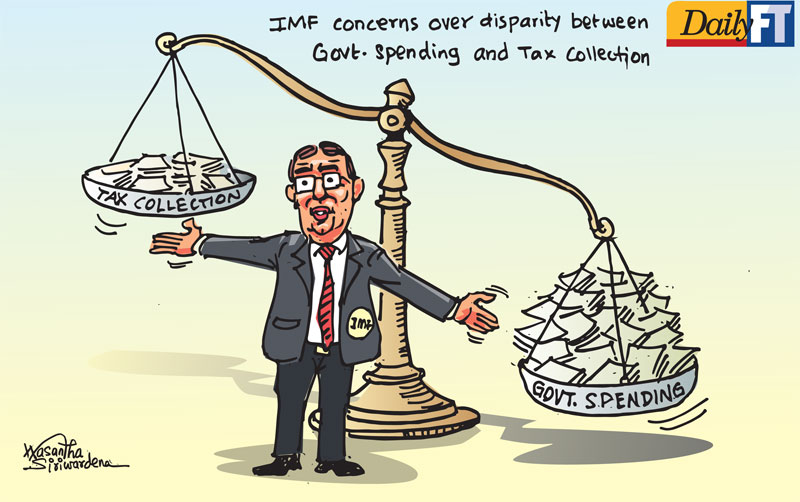Sunday Feb 15, 2026
Sunday Feb 15, 2026
Monday, 2 October 2023 01:25 - - {{hitsCtrl.values.hits}}

President Wickremesinghe in conversation with IMF Chief Kristalina Georgieva in the UN compound last week on the sidelines of United Nations General Assembly sessions
 President Ranil Wickremesinghe addressing the heads of state at the UN General Assembly, called for the expansion of the UN Security Council’s composition as essential for world peace. He also highlighted the reforms he initiated in the economic, financial, institutional and reconciliation fronts as being directed towards rebuilding trust and confidence between the people and the Government and as laying the foundation for economic stabilisation and sustainable recovery.
President Ranil Wickremesinghe addressing the heads of state at the UN General Assembly, called for the expansion of the UN Security Council’s composition as essential for world peace. He also highlighted the reforms he initiated in the economic, financial, institutional and reconciliation fronts as being directed towards rebuilding trust and confidence between the people and the Government and as laying the foundation for economic stabilisation and sustainable recovery.
Further in Berlin addressing a development forum he noted that “many developing countries are burdened with substantial debt, highlighting the inadequacy of existing mechanisms like the IMF to address this new situation and which have no mechanism to resolve this new situation. Without the World Bank and Samantha Power, I would not be here today.” “Like it or not, Asia depends on China’s prosperity. If China falls, so will we! America and the European Union should negotiate with China,” he noted.
Sri Lanka
President Wickremesinghe certainly faces huge challenges in this regard. The Lankan economy, which shrank by over 7% last year and by 11% in the first quarter of this year, continued its downward plunge with a further shrinkage by 3% in the second quarter. The absence of queues and shortages is a huge plus, but it is not due to the economy picking up but because the general public have less and less money to spend since prices are high.
With inflation in the past year having halved the real income of people and by outrageously high interest policy that has sunk the SMEs and the hotel sector, and high taxation of those in the tax net further impoverishing those in the middle income and professional categories, unfortunately some are leaving the country leaving behind gaping capacity holes in various sectors of crucial importance to the economy.
For a start the Government must get the professional class and business class who are not in the tax net to pay something from now on to ease the burden on those already paying taxes. A granulised per capita direct tax revenue map for each professional sector and business sector, may be a place to start with, in assessing our options. If the IRD can’t, the private sector could do it collaboratively.
Revenue collection
The tax reforms that have impacted the middle, working classes and professional classes directly and the increased sales taxes that have impacted the poor are still not covering the gaping hole in the country’s finances that need to be filled for IMF support to be forthcoming. Government revenue has seen a shortfall of Rs. 100 billion as compared to the revenue target agreed with the IMF. There is a clear pressure to look at several other areas to increase taxation. The country requires economic growth to make a full recovery. The IMF I assume, understands this challenge. Sri Lanka is not a dictatorship to introduce draconian tax laws to meet unrealistic revenue targets. Certainly there are several other ways to increase tax revenue and cut Government expenditure.
It is expected that debt restructuring will lower Sri Lanka’s gross financing needs over the medium term and long term, in line with the targets under the IMF’s Extended Fund Facility, and support an improvement in the country’s debt metrics over the next five years. Local-currency debt restructuring could accelerate progress towards the restructuring of external debt and bring lending rates down. Whilst stronger revenue generation is key to the full IMF programme implementation, fiscal measures in particular, will be central to achieving debt sustainability and sustainable economic recovery. The risks still remain significant, as the legacy of weak revenue generation of the past presents challenges to achieving a faster reduction in the budget deficit and Sri Lanka’s debt-to-GDP ratio.
Given the current levels of revenue collection, the partisan political climate and the attitude of our bureaucracy, doing more on the revenue side will be a challenge. Therefore the Government needs to work with the IMF to look at alternate financing options and speed up the SOE reforms, whilst reforming the public services.

References:
https://www.imf.org/en/News/Articles/2023/09/27/tr092723-press-briefing-on-sri-lanka
https://srilanka.un.org/en/246891-president-ranil-wickremesinghe-addresses-united-nations-general-debate-78th-session.
https://srilankamirror.com/news/president-addresses-the-berlin-global-conference/